‘Very Early in My Career, I had Decided I Would Never Play Subservient Women’
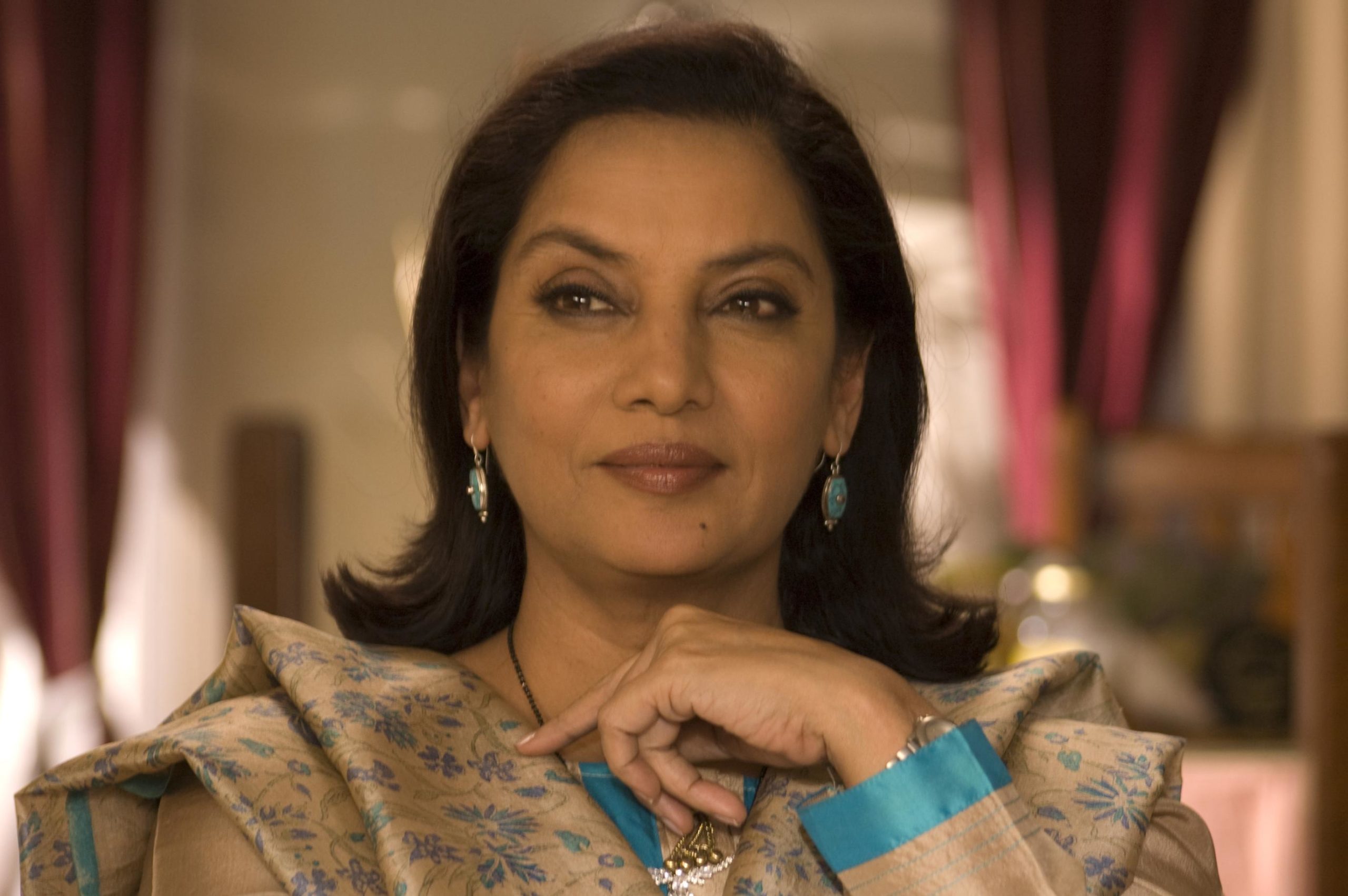
MUHAMMED NOUSHAD meets SHABANA AZMI at her Juhu residence in Mumbai and interviews on a range of issues – her perspectives on acting in film and theater, selection of roles, Bollywood and women, India’s changing political scenario, feminism, social work and family life. Madhyamam annual supplement in 2010 carried this interview in Malayalam.
You have always been very proud of your parents: Urdu poet Kaifi Azmi and Prithvi theatre’s famous actress Sahaukat Kaifi. How did your parents influence your worldview, especially your attitude towards art?
Sahabana: Of course my worldview got affected by my parents. They taught me by examples. The fact that we were liberal, my father was a card-holding communist, he was a full timer had a deep impact on me. And my mother had to travel a lot for the Prithvi theatre and Indian People’s Theatre Association. One of her motives to do so was to help my father financially. When my mother went out to work, there was no problem for my father to dress up me and my brother and taking us to school. My father wrote a poem 60 years ago called Aurat, which means woman. It says “arise my comrade and march with me” and that shaped the fact that, men and women are equal. I always thought and believed so.
I have always taken for granted that there is equality and there is much more important things than people can just buy with their money. We were living in a commune-like small cottage, which was called Red Flag; still we had guests like Beghum Akhtar, Firaq Ghorakhpuri and Faiz Ahmed Faiz. All these famous people used to come and live in a very uncomfortable little room as house guests, despite the luxurious hotels in Bombay! Thus we learnt to value that there is something much more important than money. One of the most famous poems by my father is Makan, meaning ‘building’. It is about laboruers who take pain to complete the construction of a huge, beautiful building; but once the work is complete, they are prevented at the gate from entering. They sleep on the pavement before the building and remember their days of labour. I think my works for the slum-dwellers must definitely have been inspired by this poem too.
I was only seven years old when my father bought me a black doll and told me that black is beautiful too, at a time when I was in an English school and I wanted a blonde doll with green eyes, like everybody else. But that is the kind of education he gave. He taught me by examples. And what I learnt most of all is secularism, equality and respect for pluralism. The fact is that even today we celebrate Diwali, we celebrate Holi, we celebrate Christmas, we celebrate Eid; we celebrate all the kind of cultures and all cultural festivals.
ACTING
You’ve been a very successful actor in Indian cinema, both parallel and mainstream commercial. You’ve mentioned before that you have been trained in the Stainslavskian method of acting at Film and TV Institute of India. What are the preparations you make before acting a role?
When I acted in a film called It Is A Wonderful Afterlife, by Guridder Chadda. I put on 24 pounds for the part, because it was necessary. I could have so easily worn a body suit. But you realize if you actually put on the weight and gait and everything, the effect changes. For example, for Mandy of Shyam Benegal, I had put on 12 kilos and immediately, for Khandhar, I had to reduce that weight. So an actor’s body weight is really dependent on the part. Today it has become more common, that people do that. Earlier, particularly in mainstream cinema, there were no such requirements. You could be a police officer and you could have long hairs, nobody would ask any questions. Today it is becoming much more realistic. It is how the character looks that determines such things. Two examples I always give are, one of Mandy, in which I put on weight and I actually went and visited three brothels: one in Delhi, one in Mumbai and one in Hyderabad. I actually went and met people and tried to find out what kind of lives they live. On the other hand somebody like in Khandhar is a very introverted person. I didn’t have to think about anything except of the utter loneliness of a girl like her. She is beautiful and has her sole mother to look after. There, it is an internalization of character. I always say, it is different from one another. Sometimes, I just walk straight into the character, sometimes, I just open a window and close it and enter very tentatively and ask, “alright, can I cross this threshold?” Then, after that, it works differently. But what you have to do is, what we have been trained is this. An actor should be able to prefix the word “if I were..” If I were Mother Teressa, if I were a slum dweller or a queen or anybody and do it to the perfection. So, I build a back-story, and try to find the subtext that is not in the dialogue. Where was she, how was she born, what was her education, things that you don’t find in the actual film. Finding background for the character is very important.
Reviewing your debutant performance, Satyajit Ray said you are one of the finest dramatic actresses in the country. And you have been to foreign productions as well. How do you differentiate approaches in acting in India and elsewhere?
Well, today it is becoming less and less. However, for foreigners, especially for westerners, the standard of acting is different. The amount of demand they have for the actor is different. You have a complete script which we never had till about five or six years in India. But, otherwise, there is no difference in the basic idea of inhabiting a part, a person you do not know. Nowadays, we have started getting complete screenplays which we never used to get earlier. But, finding out about a character – you find out not only from the dialogue, but you also find out from what is said about the character by the other characters. You also find out what is not said about the character by other characters. What is in between, in the sub-texts? That is what you find out.
In India, we are more dramatic, we are more exaggerating, everything of ours is expressed with less subtlety, it is because of our culture. For instance, when we mourn the death of our loved ones, we do so with breast-beating. But there it doesn’t happen like that. So, there is a basic cultural difference in the way we express our emotion, we express emotions more liberally, informally and more openly, and that is revealed in our acting.
You have acted in dramas. For example, there have been several staging of Tumhari Amrita. What differences did you feel between acting in cinema and drama?
I am basically a professionally trained actor for film, and I think primarily of myself as a film actor. But I have always loved theatre, because my mother is from theatre. I was only three years old when she used to make me travel with her for Prithvi theatre during the vacations and I enjoyed working in theatre very much. I think it is the best thing for actors to be able to work in both mediums. But primarily I think of myself as a cinema actor. Many actors say it more organic because in drama you get much more time. In films, you do bits and pieces, here and there, you can shoot a scene today and may be you can leave it incomplete and you can have to pick it up after 15 days. So it is done in fragmented ways, whereas in theater once you go after it and you can complete it the way you want to.
One of the main criticisms against our mainstream cinema is that there the women are treated as sex objects or mindless objects. What is your perception?
I think that has changed a lot. I mean, this is an old stereotypical notion about it. If you look at even mainstream cinema today, that is changing very quickly. I think today we have finally begun giving our women some of their due. There are a lot of substantial roles coming for women which weren’t available earlier. But I think we need to see more working women on screen. You know a lot of women work in our country whether it is rural India or urban India. Women do work. So, we consciously need to see more positive images of women, we need to see women being strong and we need to get more positive images of empowered women on the screen. I feel that it would help actors, if female actors start demanding such roles for themselves, rather than playing stereotypical roles into which they were put many years ago.
But we haven’t heard of many female actors who demand strength for the roles they play. Do you put some conditions when you are offered a role?
I have been there for so long that these conditions now come automatically. When people offer me a role they will never offer me a role which they think I wouldn’t do. For instance, in my career, very earlier itself I had decided that I will not play roles of subservient women. And so those roles are not even offered to me.
So, do you think Indian filmmakers and viewers have started looking at women with more respect?
Of course, a lot of the independent cinema people who are today’s heterosexual men, have started this. Even if the role of the women may not be very long, the portrayal of women has become more bold, more gutsy, more with the times. I think that has got a lot to do with the sensibility of the younger filmmakers who are urban English speaking western educated kids who are still learning. I am not saying that all of them have learnt. Still there is a long way to go. India is a country that lives in several centuries and we have contradictions everywhere including with the position of women. But there is a growing number of people who understand that the audiences don’t want to see subservient women and simpering wives. They want women to be reflected more positively. And I think that is a happy change happening.
Director Vinay Shukla said the protagonist of Godmother was written Shabana Azmi in mind. Had there been no Shabana, it wouldn’t have been written. This is just another example of the many ways through which you have empowered the representation of women on Indian cinema. What do you feel about it?
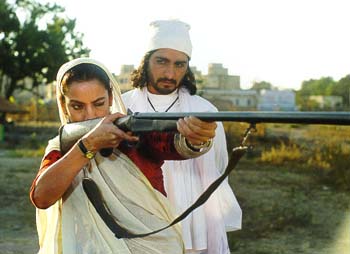
“I cannot play a strong woman who is fighting for women’s rights and then come home and not bother if my maid servant is not being treated well.”
I think it worked both ways. I was lucky to get those roles and because I got those roles my image was built by the roles like that. Mahesh Bhatt’s Arth continues to remain a definitive sort of cult film in Hindi cinema. Even after 25 years people still come up to me and say that it transformed their lives, that film. So, it works both ways. And I moved into activism, I moved into social work. You know when you play a particular kind of part, some of the residue of the part will come into your daily life also. I cannot play a strong woman who is fighting for women’s rights and then come home and not bother if my maid servant is not being treated well. I will see to it that she is empowered in the right way. And I run two NGOs. One NGO is called Mijwan Welfare Society, it is in a tiny village in Azamgarh, was formed by my father. It is all about empowerment of the girl child. And I work in the slums in Mumbai with an organization called Nivara Hakk. Anand Patwardhan is also part of this movement.
Director Aparna Sen once said your off-screen personality has become so powerful that people do not expect you to do meek roles. So do you find this a difficulty as an actor?
As an actor, it is not an ideal situation. But the thing is that it is changing. For instance, I have done so many comedies recently, and people have accepted it though they hadn’t expected them, as my off-screen persona is that of a more serious person. So over the years, it keeps getting changed.
SOCIAL WORK
You are very famous for your involvement in the struggles of the slum dwellers in Mumbai. You have several times opposed slum demolitions in Mumbai. Don’t you think it is altogether a problem of conceptualizing development?
Of course, the main problem in our country is this: whose development we need and at whose cost? It cannot be the development of a few at the cost of many. The model of development that we are following is making the divide between the rich and the poor even greater. Unless the fruits of the economic development are going to be shared in a just manner, we can never have peace in our society. The rich are getting richer and the poor are getting poorer. What is important is that we should empower our citizens in so simple things like food, water and shelter. Unfortunately we are still unable to guarantee that most of our people have these basic things. It is taken for granted.
But, very few of your colleagues in the huge entertainment industry are aware of such issues. Very rarely celebrities speak about social causes.
I think they are getting more and more concerned. Basically, they are very busy people, they have very little time to do. But there are young people like Priyanka Chopra who is doing her bit for the environment, there are various others working on various things. I think the scenario is changing. But it may take more time, it would be good, because I think the art should be used as an instrument for social change. And celebrities have a big say, and I think they are becoming more conscious of it and beginning to do their work which needs to be streamlined.
You were always in the forefront of fighting religious fanaticism and communalism. Both against the Hindutva project and the Muslim fundamentalism.
I think majority and minority fundamentalisms are equally dangerous, Because they are mirror images of each other. I believe that the fight today is not between the Hindu and the Muslim, but between the liberal and the intolerant. So the liberal Hindus and Muslims need to come on the same side against the intolerant and extremist Hindus and Muslims on the other hand. It is a question of ideology, not of religion.
Do you think that the liberal side is losing in this long unending battle?
No, I don’t think the liberal side is losing, except that they lack the wherewithal, because this is something that needs a sustained effort. And normally we rush in after a riot has happened. The maximum work needs to be done before the riot happens. Because you are supposed to create a spirit of harmony, especially when you see a potentially dangerous communal situation emerges. We need to defuse the tension rather than ignite it. So, we need to hear much more liberal voices. But the press also plays its part. Whenever some fanatics say something stupid, it’ll catch huge headlines. But when the liberal talks sense, they don’t get the same kind of space and attention because it is not so sexy. So the media also needs to play up, the liberals’ voice. It is not as if the liberal voice doesn’t exist. It doesn’t get the same kind of attention that the extremist voice does because that makes good “copy”.
It sounds that, by and large, Muslim celebrities in India are getting conscious of their identities recently. Amir Khan and Sharukh Khan indicated their ‘Muslimness’ in responding to certain issues. You complained in an interview that you couldn’t buy a house in Mumbai because you are a Muslim.
No, I didn’t say that. See, this has become very dangerous. People just pick them up and highlight. They just edit it out from the context. They asked me whether I thought that the discrimination exists in our country. I said, of course, yes. It exists against women, it exists against minorities and it exists against Dalits. But what is more important is that there is a very robust resistance against that. You have a civil society, you have the law. And in fact I said Muslims are comparatively in a good situation in spite of all the terrible things that keep happening. Muslims are safer here because it is a democracy and an average Muslim can aspire to be an Irfan Khan or Sharukh Khan and Azim Premji and Kalam. There is no doubt that they are in a very weak position as the Sachar Committee says. But the fact is that we have greater chances as we are in a democracy and not in a theocracy. Out of this conversation, everything was removed and only one small thing was highlighted, which is mischievous and sad.
As an activist, you have worked in the grassroots level. And you were privileged to be a nominated member of the Upper House. While sitting at Rajya Sabha in parliament, what did you find wrong with our system of governance?
Well, I think a lot of it is right. A lot of effort goes in passing bills. But basically there isn’t enough connectivity among those who are in the grassroots level and those who form policies. That is why I am a great votary of the National Advisory Council formed by Soina Gandhi. Because both the RTI and the National Rural Employment Guarantees Scheme, both are two absolutely landmark things that have happened in our country. They came because of the National Advisory Council. So we need far more civil society action to work in tandem with the government in influencing policies.
You have been often described as a feminist actor. How do you comment on the feminist movement in India?
I think the feminist movement in India is doing very well. The movement has insisted on placing the girl child on the sector of development and that is the only way to go forward. And I think the feminist movement in India is different from the movement in the west. Because in the west it is person oriented, it is your individual thing, whereas the family is a big part of Indian psyche, whether it is for the man or the woman. That becomes very important in negotiating a difference. What women are saying today is that we are different. We are not better, we are not worse, we are different. And that difference needs to be celebrated. Because for far too long, solutions to all problems have been sorted and met from the male point of view. Women are saying we constitute half the world and we need to be included whether it is about the art or politics or peace or environment. Women are negotiating more space for themselves.
Coming back to your acting career: if you are asked to select your best liked films?
It is difficult, but I would definitely say Ankur, because it was my first film, I would say Khandhar, Arth, Paar, Godmother: all the films for which I got national award.
Can we expect you directing movies?
No. I have no interest in directing.
FAMILY
Farhan Akhtar and Zoya Akhtar are also very active in the filmmaking scene. Your comment on their works?
I think they are doing extremely well, they are both away at the moment. I am very proud of Zoya, I have liked her films very much. I liked Farhan’s films too. I am happy that they have imbibed the right values. That they are talented, that they are recognized on their own rights, and I am very proud of them.
Finally, kindly say a few words about your famous husband, Javed Akhtar.
The fact is that my husband and I share a common worldview. And he is in very many ways like my father. My father has been my hero, so it would have been very tough for any other man to come into his place, so it is good because Javed is a feminist, Javed has a worldview which is similar to mine, Javed has exactly the same cultural background as mine and we are each other’s best friends. In fact Javed says very often that we are such good friends that even marriage couldn’t ruin our friendship.

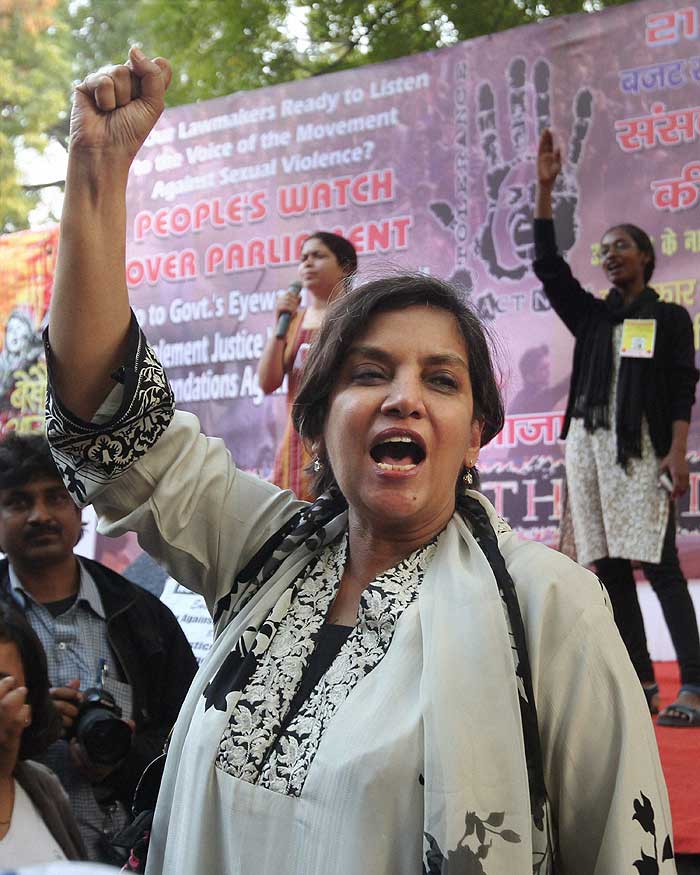
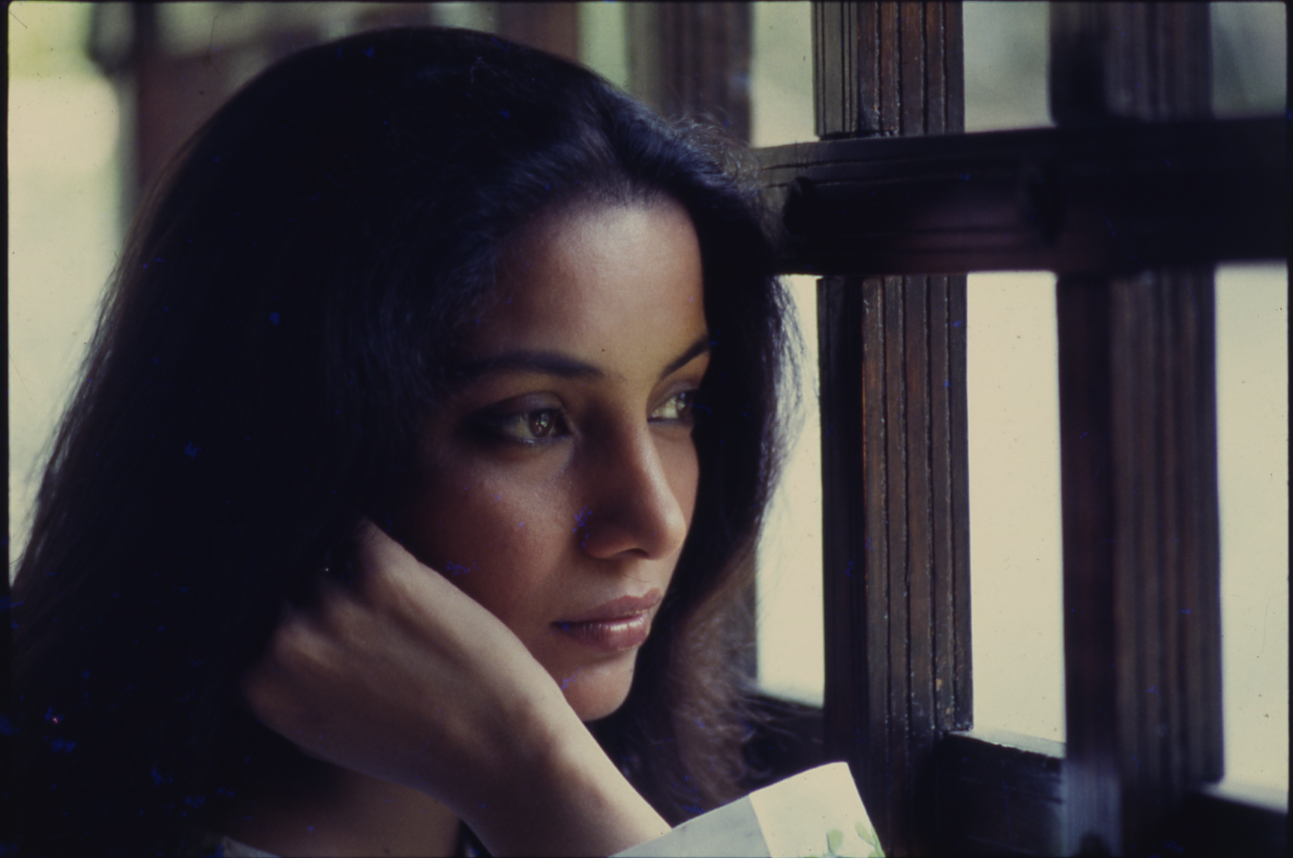
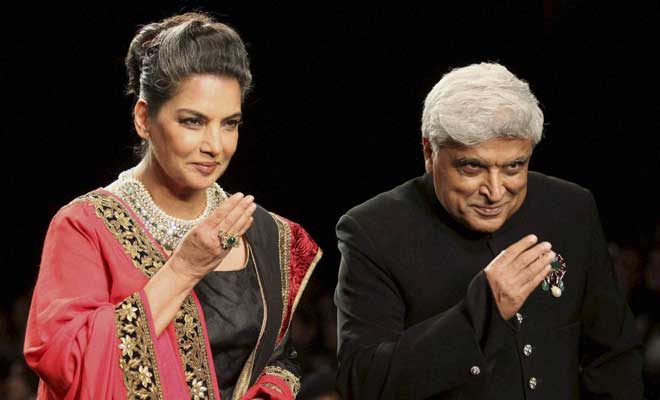
Glad to read Shabana Azmi’s interview.
A small note: It’s Mandi, her film and not Mandy.
ഇവയുടെ മലയാളം കൂടി ബ്ലോഗില് അപ് ലോഡ് ചെയ്തിരുന്നെങ്കില് നന്നാവുമായിരുന്നു..